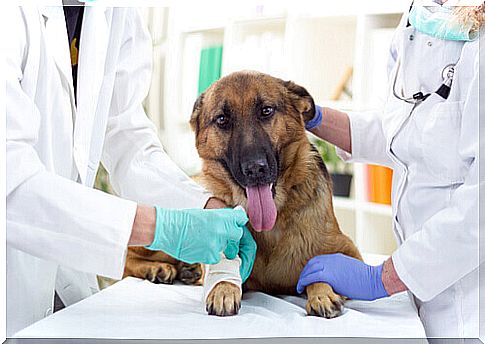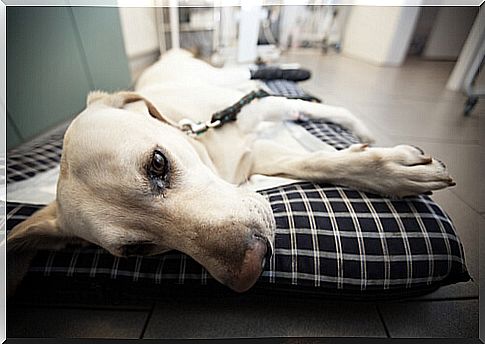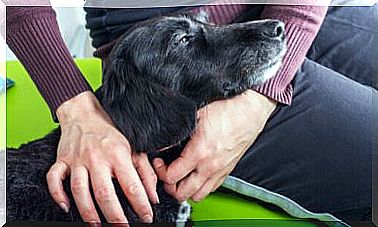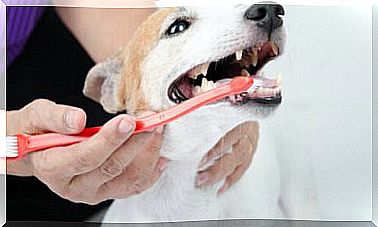Is Chemotherapy For Dogs Aggressive Like Ours?

When we think of chemotherapy, strong images come to mind. Its side effects, which we do not want and which cause us fear, appear clear in people. But, what about our pets ?
Chemotherapy, the concept

At first, we can define chemotherapy as the set of drugs that attack cancer cells, preventing them from developing and multiplying.
Depending on the type of cancer and the condition the animal is in, veterinarians will choose the appropriate protocol and procedure. Among the measures to be used, there is the use of one or several medications, removing the tumor before or after the sessions and, in some cases, radiotherapy.
Is the treatment beneficial?
With our dogs, something similar to what happens when, unfortunately, a tumor is diagnosed in a friend or family member. Doubts arise about the advantages of applying or not chemotherapy.
It is worth mentioning that, in veterinary matters, chemotherapy is different from what is carried out in the case of human medicine. The main objective is the treatment of cancer, but not with the consequence of putting the animal’s life at risk.
In many cases, when the dog begins to show side effects to the medication, the protocol must be modified. The drug or dose is changed and, in extreme cases, the treatment is withdrawn.
To all this we must add that dogs and cats have been shown to tolerate chemotherapy much better than people.
What is the chemotherapy procedure in animals?
In the case of our pets, chemotherapy is usually given intravenously. It can also be administered subcutaneously through the animal’s skin. In some cases, it is even possible to administer it orally, at the clinic or at home. All this depending on the degree of the disease, the characteristics of the animal, the type of medicine applied, etc…
A continuous follow-up to chemotherapy
Before the start of each session, the ideal is an exchange of views between the owner of the animal with tumor and the veterinarian . With this, it will be possible to decide if the most convenient is to continue the treatment or to paralyze it.
In addition to this communication, the veterinarian must carry out a complete clinical examination. There will be weight control, tumor size review and confirmation that there was no evolution.
The duration of chemotherapy sessions can be between 30 minutes and an hour. The time depends on the type of medicine being used. Once the session is over, the animal can return to its home with complete normality.
When chemotherapy is given intravenously, the animal should be taken to the clinic once or twice a week.
In most cases, chemotherapy is performed without sedation. But in some cases, especially in cats, it may be necessary.
Blood tests are also usually performed once a week, along with a red blood cell and defense cell analysis chart. When these exams are altered or with signs of abnormality, the best thing is for the animal to rest and wait for these values to improve before doing the next session.
Some Side Effects of Chemotherapy
Normally, the dogs end the chemotherapy sessions without and made side. However, some very sensitive animals can have gastrointestinal problems in the form of diarrhea, vomiting, loss of appetite, etc. These are usually fleeting episodes, which disappeared within a few days. There are even medications to alleviate these effects.
There is also talk of hair loss (which occurs in people undergoing this aggressive treatment). In the case of animals, this adverse effect is uncommon.
Some advices

If our pet is receiving chemotherapy, there is no need to change their lifestyle. He can continue with all his daily routines. But you need to take some precautions:
- It is advisable to avoid direct contact with our animal’s urine, feces and vomit, especially in the three days following chemotherapy. This contact should be made wearing gloves. If the animal urinates or defecates at home, it must be properly disinfected.
- If we’re going to administer a pill treatment, we’ll do it with gloves as well. We must not break the tablets or open the capsules, as they can produce a release of gases, harmful to human beings.









